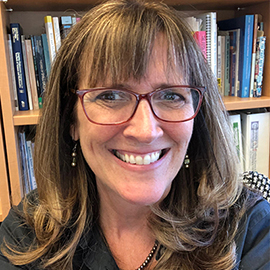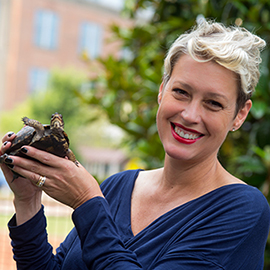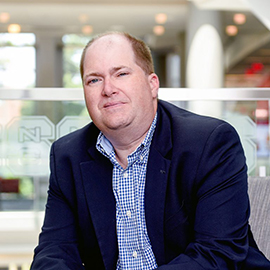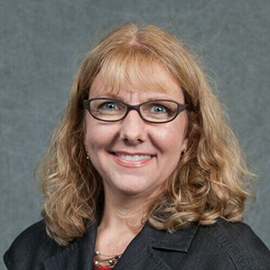2020-21 Provost Faculty Fellows
Four Fellows will embark on specific projects throughout the 2020-2021 academic year, with mentorship provided by senior administrative officials. James Mulholland, associate professor and director of graduate programs in the Department of English, was also selected as a Fellow and elected to defer his participation until the 2021-22 academic year.

Margaret Blanchard
Associate Department Head, Director of Graduate Programs, Professor, Department of Science, Technology, Engineering and Mathematics (STEM) Education, College of Education
Mentor(s): Peter Harries, Dean of the Graduate School
Project: “Recruiting and Retaining Diverse Graduate Students in STEM”
The overarching goal for my project is to understand more about the recruitment and retention of NC State graduate students who are underrepresented in STEM majors. First, I will survey the current grants and projects at the university that have recruited and/or seek to retain underrepresented graduate students in STEM. Then I will conduct focus groups and/or individual interviews to investigate why the underrepresented graduate students selected NC State and what recommendations they have for better supporting their success. This project will result in a written report consisting of a literature review around best practices for recruitment and retention of underrepresented graduate students, questionnaire results from faculty/staff involved in STEM projects to learn the nature and extent of current efforts to recruit and retain underrepresented graduate students in STEM, and focus group/interview analyses of underrepresented STEM graduate students related to such things as why these students selected NC State, how their experiences are going, and what recommendations they have for better supporting their success. Given COVID-19 circumstances, these interviews will be requested via Zoom.
My research has focused on designing and studying teacher professional development projects, with the goal of enhancing students’ STEM learning experiences and stimulating career interest. These projects have studied teachers, students, leaders, and families in rural North Carolina, recently through STEM Career Clubs at four rural middle schools and a USDA project with rural high schools. I want to understand more about recruitment and retention issues at the university level by learning about the experiences of diverse graduate students in STEM, and how to best recruit and support them as we seek to diversify the academy.

Dianne Dunning
Associate Dean for Advancement, Clinical Professor, Department of Clinical Sciences, College of Veterinary Medicine
Mentor(s): Margery Overton, Senior Vice Provost for Institutional Strategy and Analysis, and Katharine Stewart, Vice Provost for Faculty Affairs
Project: TBD

Dan Monek
Department Head, Department of Music, University College
Professor, Department of Graphic Design and Industrial Design, College of Design
Mentor(s): Duane Larick, Senior Vice Provost for Academic Strategy and Resource Management and Provost’s Office Chief of Staff, and Katharine Stewart, Vice Provost for Faculty Affairs
Project:
The current semester will focus on exploring two possible projects, one in the area of academic crisis management and one involving the creation and implementation of interdisciplinary programs. The first looks to adapt the fellowship in light of COVID-19 and draws on the current challenges facing the university as an opportunity to learn how an institution chooses to prepare, respond and adapt to challenges that impact academic programs. The second area looks at identifying barriers and improving pathways to increasing interdisciplinary scholarship and programs at the university in support of past and continuing strategic plan goals.

Laura Sremaniak
Teaching Professor, Department of Chemistry, College of Sciences
Mentor(s): Greg Raschke, Senior Vice Provost and Director of Libraries
Project: “Education Technologies”
This project focuses on education technologies: an evaluation of what we currently use, how they are adopted and supported, and how they enhance student learning in a variety of formal and informal learning environments. The project will focus on technologies which are supported by education technology fees and what emerging technologies are under consideration for future adoption, part of which will be informed by the work of the Leading the Digital Transformation of Higher Education strategic planning task force. Recommendations will include ways to improve transparency in prioritizing needs, faculty/administration input and feedback mechanisms, and future opportunities in emerging technologies.
This project proposal was written long before the pandemic began, but the pandemic will certainly impact it. Given the shift to all-electronic delivery of education, there is a unique opportunity to evaluate many aspects of education technology, including access to resources, continuity planning, how robust and flexible our infrastructure is to meet demand, and support for remote instruction.
A very measured approach is required in such an evaluation. Remote teaching and learning done under emergency circumstances should inform many things about our academic community’s ability to meet its mission in unusual circumstances, but should not be directly compared to carefully planned and implemented distance education courses.
Our university, like other academic communities, will likely make decisions which are greatly influenced by the response and outcomes of this current crisis (including financial ones), and this project is poised to provide a meaningful examination of the relevant issues to inform those decisions.

James Mulholland
Professor and Director of Graduate Programs, Department of English
Mentor: Peter Harries, Dean, The Graduate School
Project: Higher Up: Mentoring and Pathways for Student Diversity Recruitment
My project will focus on how faculty-student and student-student conversations about an inclusive and diverse campus can be integrated into NC State recruiting initiatives for underrepresented populations. While such efforts are well developed across higher education and at NC State, I will explore how faculty mentoring and the inclusion of current students in diversity recruiting efforts would attract more students of color and improve campus climate for underrepresented populations. The goal would be to explore links among units for a holistic pathway that would empower students by entrusting them to be a larger part of the effort toward creating an inclusive future for NC State’s campus.